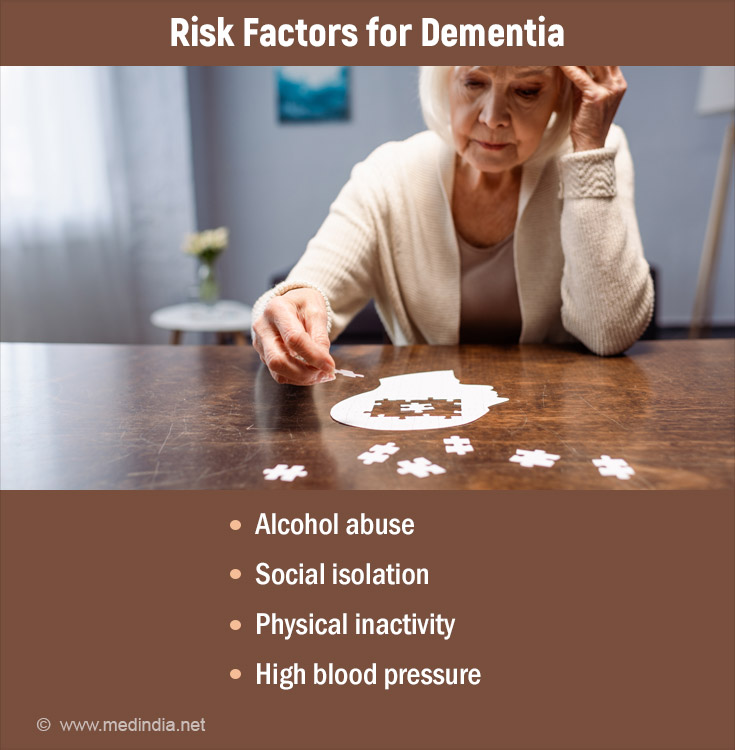- Dementia prevention, intervention, and care 2024 - (https://www.thelancet.com/commissions/dementia-prevention-intervention-care)
- Dementia - (https://www.mayoclinic.org/diseases-conditions/dementia/symptoms-causes/syc-20352013)
- Dementia prevention, intervention, and care: 2020 report of the Lancet Commission - (https://www.thelancet.com/article/S0140-6736(20)30367-6/fulltext)
About
Preventing the onset of dementia can begin as early as childhood, according to new research, with 14 risk factors identified that could help cut a global trend in half. At the Alzheimer's Association International Conference, held in Philadelphia from July 28 to August 1, the third Lancet Commission on dementia prevention, intervention, and care outlined recommendations for governments to help reduce risk, estimating that large-scale interventions could save around £4 billion in England alone. The commission publishes its findings in The Lancet (1✔ ✔Trusted Source
Dementia prevention, intervention, and care 2024
Go to source).
Did You Know?
Having frequent social interactions can help build cognitive resilience and reduce the risk of developing dementia. #dementia #riskfactors #medindia
What is Dementia?
Dementia refers to a group of neurological disorders defined by symptoms that impair memory, communication, and thinking (2✔ ✔Trusted Source
Dementia
Go to source). Although dementia is more common as people get older, it is not a normal component of the aging process.
Types of Dementia
- Alzheimer's disease
- Vascular dementia
- Lewy body dementia, linked to Parkinson's disease
- Frontotemporal dementia
- Mixed dementia
Risk Factors for Dementia
In 2020, the Lancet Commission identified 12 risk factors associated with 40% of dementia cases (3✔ ✔Trusted SourceDementia prevention, intervention, and care: 2020 report of the Lancet Commission
Go to source). They are:
- Alcohol abuse
- Smoking
- Diabetes
- Obesity
- High blood pressure
- Air pollution
- Brain damage
- Physical inactivity
- Depression
- Social isolation
- Hearing loss
- Lower levels of schooling
According to the Commission's latest report, high cholesterol beyond the age of 40 and vision loss are new risk factors for dementia, accounting for around 9% of all cases - 7% for high cholesterol and 2% for vision loss.

Health Strategies Must Address Dementia Risk Factors
The present report indicates that, due to a rapidly aging global population, the number of persons with dementia is anticipated to nearly triple by 2050, from 57 million in 2019 to 153 million. Longer life expectancy in low-income nations is leading to an increase in dementia, with a global economic burden of more than $1 trillion every year.
Andrew Sommerlad, BMBS, Ph.D., one of the Lancet Commission report's authors and an associate professor at University College London's division of Psychiatry and Consultant Old Age Psychiatrist at Islington Memory Service, said that governments around the world would need to take a broad, organized approach to combat the expected increase in dementia over the next few decades.
"Many of the known risk factors for dementia can be influenced by health and government policy and this is likely to be the most effective way to support people to make lifestyle changes which they would not otherwise be able to do themselves," said Sommerlad. He stated the provision of socially integrated housing, activities, and volunteering opportunities in old age as examples of helpful interventions encouraged by health policy.
David Merrill, M.D., Ph.D., a board-certified geriatric psychiatrist and director of the Pacific Neuroscience Institute's Pacific Brain Health Center in Santa Monica, CA, who was not involved in the study, told MNT that public health officials should prioritize addressing these risk factors for dementia.
"Keeping modifiable risk factors for dementia front and center in the discussion of achieving healthy brain development and subsequent aging informs governmental public health initiatives across the lifespan," according to Merrill. "Taking a stance that improved health across the lifespan leads to higher vitality with aging is one way to get dementia risk reduction taken seriously," he pointed out.
Social Isolation is a Crucial Factor in Dementia
Vivek H. Murthy, the Surgeon General of the United States, has described the current condition as a "epidemic of loneliness," aggravated by social media and technology. Murthy associated social isolation with health problems such as substance misuse and obesity.
Similarly, Merrill referred to social isolation as "the new smoking." Sommerlad stressed the importance of frequent social contact in lowering the development of dementia. "There is consistent evidence that having more frequent social contact with others and lower levels of loneliness are linked to lower dementia risk," the researcher said.
"This is likely to be because social contact in any form is an effective way of exercising our brains to build cognitive reserve, or resilience, against dementia pathology," said Sommerlad. Furthermore, "social contact may also promote healthy behaviors, such as exercise and diet, and reduce stress," he advised.
How Does Alcohol Consumption Lead to Dementia?
Some reports suggest that younger generations, at least in the United States, are drinking less than their elder counterparts. However, there is mounting evidence that any alcohol usage increases the likelihood of acquiring dementia, among other health concerns.
"The evidence is building that drinking any amount of alcohol is damaging for dementia risk and general health so reduction over time in the proportion of people drinking or engaging in other risky health behaviors is positive," said Sommerlad. "We also know that some risks have increased over time - for example, obesity levels - so we have to monitor trends and respond to these."
Merrill shared a similar attitude concerning alcohol consumption, noting that different sorts of drinking can cause the same brain harm. "Heavy alcohol consumption is a modifiable risk factor for dementia." This can include substantial everyday use as well as occasional binge drinking. "Both are detrimental to brain health as we age," he said.
"It's now increasingly accepted that there is no 'healthy' amount of alcohol intake for the brain or body, so one would imagine that the trajectory of dementia would improve with less alcohol use," according to Merrill.









